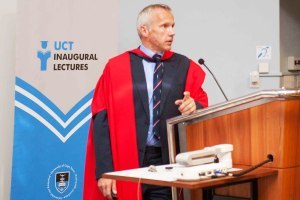Neglected pandemic kills 5.8 million a year
10 April 2014 | Story by Newsroom
"No-one talks about it or studies it; it's not part of the Millennium Development Goals; there are no global funds fighting it; and the World Health Organisation has devoted few resources to it," said Wallis in his inaugural lecture on 2 April, the first of UCT's 2014 series.
"This needs to change."
Wallis had already started that change process some years ago.
Graduating as a medical doctor in Edinburgh in 1993, Wallis trained in the Royal Navy (he's a retired lieutenant surgeon commander) and was posted to Iraq for two years. En route from the Antarctic in 1998, his Royal Navy ship docked at Cape Town.
The view of Table Bay was alluring; he settled here in 2002, qualifying as a Fellow of the College of Emergency Medicine in London the following year, and adding a doctorate in paediatric disaster triage in 2006.
Frustrated by the huge amounts of energy and money poured into vertical programmes addressing single diseases like HIV and tuberculosis, Wallis has tackled the lack of resources and funding committed to injury care with some tenacity.
"Clearly these programmes have been very beneficial for those patients, but they come at a wider cost: they don't benefit any other patients, and there's evidence that where countries put significant resources into vertical programmes, the rest of the health system suffers."
Urbanisation
In the Western Cape alone, there are more than one million emergency centre visits every year. Extrapolate that into Africa, where urbanisation (and all that accompanies it) is accelerating fast.
Currently, 37% of Africans live in cities, a figure expected to rise to 54% by 2030. And then consider just one scenario: Africa has 2% of the world's cars but 20% of its car accidents.
Wallis' typical approach has meant "getting his hands and feet dirty" (as emergency personnel tend to do).
The main burden of disease in most African countries presents as emergencies, yet emergency care is massively neglected.
But even rudimental first aid can help save lives, he says.
Take as an example their initiative in the gang- and crime-ridden suburb of Manenberg, which has a huge trauma problem, and where Wallis and the province's emergency services have trained 2 000 "community responders".
"We train them at low cost and these are the people who help until Emergency Metro Services arrives. They provide basic first aid, using basic equipment. They save lives."
The same could be done for the guard-tjies on minibus taxis, for example.
250 free copies of handbook per country
In order to assist national efforts to nurture emergency care systems, Wallis has developed extensive networks in Africa. He founded the African Federation of Emergency Medicine (AFEM) and when he co-authored the Oxford University Press AFEM handbook of Acute and Emergency Care, he lugged it across sub-Saharan Africa to ensure it was distributed: 250 free copies per country.
The handbook presents a unique, stratified approach, tailored to the African context.
"It starts with the premise that there are no emergency resources available and says this is how you can manage specific emergency situations. It's medicine in hostile environments. It's how we used to treat people in the old days."
There are plans to translate it for Francophone African countries.
Wallis also began the quarterly, peer-reviewed open access African Journal of Emergency Medicine, published by Elsevier (and available on an iPad app), the official journal of the African Federation for Emergency Medicine.
For Wallis, it's all part of an integrated plan to get injury care education out there − and putting it to work.
(Wallis is part of the Department of Surgery in the Division of Emergency Medicine in the Faculty of Health Sciences. His lecture was titled Shifting Focus: Addressing the neglected pandemic.)
Listen to the audio recording of the lecture by Prof Wallis.
Read the 2013 Inaugural Lecture Series online.
Story by Helen Swingler. Image supplied.
 This work is licensed under a Creative Commons Attribution-NoDerivatives 4.0 International License.
This work is licensed under a Creative Commons Attribution-NoDerivatives 4.0 International License.
Please view the republishing articles page for more information.










